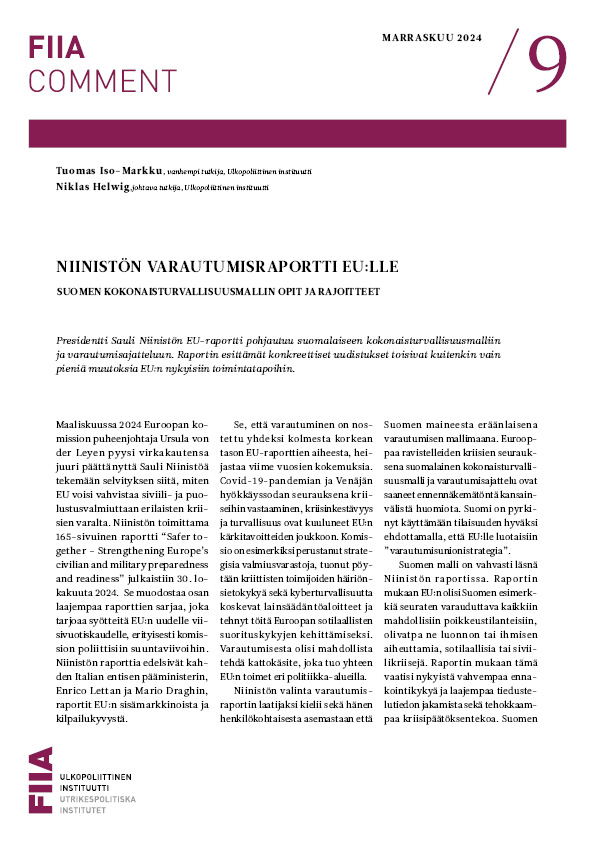Since its formation in mid-2018, the new Italian government has engaged in a series of arguments with France, most recently over the controversial actions of an Italian minister. However, these tensions have deeper roots that can be traced to different views on Libya and migration.
The decision by the French government to recall its ambassador from Italy on 7 February 2019 marked a peak in the recent tensions between Rome and Paris. It was an unprecedented act in the post-1945 history of bilateral relations, and a worrying sign of antagonism between two founding members of the European Union.
The controversial statements by Luigi Di Maio, Italy’s deputy prime minister and leader of the Five Star Movement, were the immediate cause of the French decision. In late January, Di Maio accused France of pursuing “colonial policies” in Africa. A few weeks later, he travelled to France to meet some radical members of the Gilets Jaunes (Yellow Vests), a grassroots political movement that has led mass protests and called for the resignation of French President Emmanuel Macron. The French government regarded Di Maio’s trip as interference in France’s domestic affairs and swiftly recalled its ambassador from Rome.
While Di Maio’s actions were decisive in bringing French-Italian tensions to a tipping point, the bilateral relationship had been strained for a long time. Serious divergences emerged during the Libyan crisis. In 2011, France strongly supported a military intervention in Libya, an option which Italy initially opposed due to its good working relations with the Gaddafi regime (Italy had signed a Treaty on Friendship, Partnership and Cooperation with the regime in 2008). Tensions continued as France later undertook diplomatic initiatives to address the Libyan conflict without coordinating with Italy – most notably, the summit at La Celle Saint-Cloud in July 2017. Competing economic and political interests, which partly relate to both countries’ colonial past in North Africa, provide the background to their divergences regarding Libya.
With the worsening of the refugee crisis since 2014, when Libya became a crucial and deadly route for people fleeing to Europe, critical views on France’s foreign policy frequently re-emerged in the Italian public debate. France was seen as the main advocate of the Western military intervention that contributed to Libya’s political disintegration.
Emmanuel Macron’s election in 2017 raised hopes in Rome of an improvement in the bilateral relationship, as Italy was still governed at that time by a centre-left coalition. However, one of Macron’s first decisions was to block a planned merger between Italy’s state-owned shipbuilding company Fincantieri and France’s STX Shipyard. Rome saw the decision as an infringement of a negotiated agreement, in contrast with Italy’s previous acceptance of several takeovers of Italian companies by French businesses. Macron’s initiative to host the summit on Libya in July 2017 provoked further Italian criticism of the new president.
In order to repair the relationship with Rome, Macron subsequently allowed a renegotiation of the deal between STX and Fincantieri, which was completed during a bilateral summit in September 2017. Moreover, during his visit to Rome in early 2018, Macron proposed a plan for a French-Italian treaty that would boost bilateral cooperation.
However, political developments in Italy hindered further discussions on the plan. Following the March 2018 parliamentary elections, the populist Five Star Movement and the far-right League formed a coalition government. The leader of the League, Matteo Salvini, who is also a close ally of French far-right leader Marine Le Pen, identified Macron as one of his main antagonists in European politics and harshly criticised his views. Macron responded by denouncing the growing populist wave in Italy.
The main disagreements concerned migration policy. In 2011, following the Arab Spring, France began stopping trains at the border with Italy in order to prevent the entry of asylum seekers, causing Rome’s diplomatic protests. As a result, hundreds of migrants were stranded at the border for months, in precarious conditions.
More recently, tensions peaked in June 2018 when Salvini – in his capacity as Interior Minister – closed Italian ports to a ship carrying rescued migrants. Macron accused Italy of cynicism and irresponsibility. The Italian government countered that France was not welcoming asylum seekers either, and had not even implemented the relocation quota agreed upon at the EU level. Due to these tensions, the traditional annual Italian-French high-level summit, a practice initiated in 1981, did not take place in 2018.
Hence, the recalling of the French ambassador in February 2019 appears to be the culmination of long-standing tensions, which intensified after the formation of a populist, right-wing coalition government in Italy. Thanks to the intervention by Italian President Sergio Mattarella, a staunch advocate of Italy’s European orientation, the diplomatic crisis was resolved within a week. Following a phone conversation between Macron and Mattarella, the French ambassador returned to Rome, while Mattarella agreed to an upcoming visit to France.
However, the underlying causes of French-Italian tensions require deeper engagement at the governmental level. This is unlikely to happen before the European elections in May 2019, in which Macron, Salvini and Di Maio will campaign for different camps and visions of Europe.
In order to fully restore the bilateral relationship, frank discussions should address outstanding disagreements. Currently, French-Italian cooperation is essential to cope with the EU’s numerous domestic and external challenges. Most importantly, if bilateral dialogue is promoted with a focus on humanitarian issues, French-Italian reconciliation will also benefit Libya and asylum seekers.








